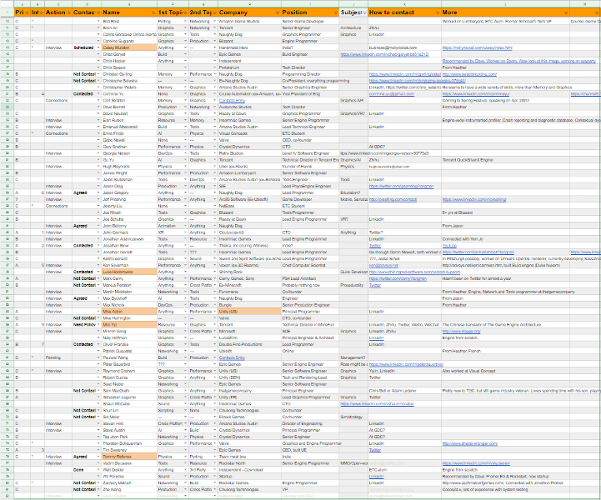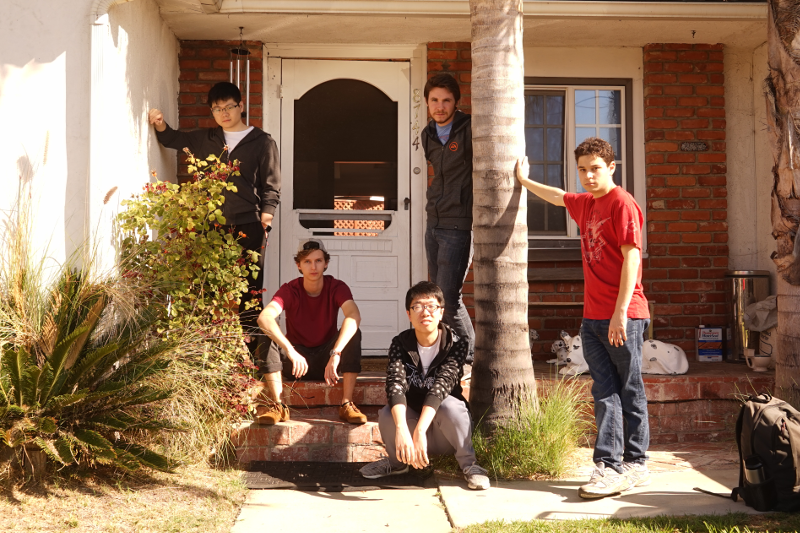Interviews
Postmortem¶

Our decision to start interviewing professional engine developers was one that came about early in the planning process. Since we wanted to prove the worth of our project as a learning tool for other novice programmers, we needed to talk to the pros to understand what they thought was necessary. We were very fortunate to receive feedback from multiple veteran engine programmers including Jason Gregory, Amit Patel, Rob Schillingsburg, and Oliver Franzke.
These talks helped us to win our case for pitching the project, though we thought there could be more to it than that. Talking to professionals regularly throughout the semester could be a great way to give our audience multiple perspectives on the engine development process. Over the summer, we compiled a list of over 100 game engine programmers, from big name CEOs to unknown indies. Once the semester started, we filtered that list based on what topic of engine development the professional specialized in.
 This is the list of people we wanted to contact by the start of the project...
This is the list of people we wanted to contact by the start of the project...
Our goal with this was to conduct an interview on a different topic each week. This turned out to be a complex, multi-step process. We began by sending emails to the professionals on our list. If they responded, we'd schedule an interview time with them. On the days leading up to the interview, the team would work together to heavily research the professional (almost to a point of stalking) and come up with a list of questions most relevant to their knowledge, experience, and background. After the interview was done, we'd take the recording and transcribe it for clarity and pass our edits on to the professional for their input. With the interviewee's approval, we'd publish the transcribed interview on our site.
At first, our process was naturally a little rough. We went the route of transcribing the entire interviews by hand, which ate heavily into our limited time frame. To remedy this, we decided to use YouTube's free auto-transcription service to get a full script of what was said. While it doesn't do an especially accurate job, it made things a lot easier for one team member to go through and correct the text. What's more, we consulted with ETC Press Editor-in-Chief Brad King to hone our formatting skills, as none of us were sure how a transcribed interview should look.
When it came to reviewing our transcriptions with our interviewees, we noticed that there were lot of extremes between interviewees. We dealt with industry corporations who will clamp down hard on any publications and try to completely control what was said in the interview. We talked to some very driven and enthusiastic individuals who would consistently comment and chime in on our edits. Conversely, we also spoke to professionals who were completely lax about the review process. Lastly, there were some developers who simply didn't get back to us at all after the interview.
On that last note, one of the most harrowing problems we faced in the interview process was when we were going out to Los Angeles to interview a number of people face-to-face. They all had agreed to interviews beforehand, but when we reached out to set up logistics a couple weeks before the trip, three of our biggest interviewees only gave us silence. We were in a frenzy trying to pick up the pieces and make the most of our trip.
 We did manage to get a few good things out of the trip, including a hot new mixtape coming to a game engine near you
We did manage to get a few good things out of the trip, including a hot new mixtape coming to a game engine near you
Working with these different kinds of personalities and scenarios added some more complexity to this part of our project that none of us saw coming. The interviewees' thoughts and stories on engine development often gave us the perfect solution for problems we were having on our own engine. They would even give us vocabulary we didn't have before.
In one of our early meetings with Brad, he raised the idea of compiling our interviews into a printed book at the end of the semester to get it in the hands of as many people as possible. We thought about the idea, and it stuck with us. Before we knew it, we were published authors (or editors).